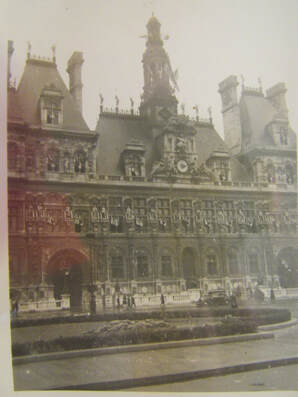 The speed with which it happened was shocking. In 1940, Panzers roared into Luxembourg on May 10, the Dutch forces were annihilated, the Meuse was crossed on May 13, and the French army and air force proved to be obsolete, ill-equipped, badly led, and fossilized by tradition. Then there was Dunkirk, and, finally, the bombing of Paris on June 3. France was quickly reduced to a vassal of the German war machine. Wanting to protect the incredible amount of art, architecture, and culture, France, now led by Marshall Petain, agreed to an armistice that divided France roughly in half. The north part, plus all of France’s shoreline, was declared as the “occupied” part of France, while the south part was called “Vichy France”. On paper, at least, it was not a German puppet but a legal, sovereign state with diplomatic relations. Led by Petain and his Catholic, conservative, authoritarian, and often anti-semitic followers, it was envisioned that the Vichy country would be purged and purified, returned to a mythical golden age before the French revolution introduced perilous ideas about equality. The new French were to respect their superiors and the values of discipline, hard work and sacrifice, and they were to shun the decadent individualism that had, together with Jews, Freemason, trade unionists, immigrants, gypsies and communists, contributed to the military defeat of the country. Meanwhile, in the north, things didn’t seem to be so bad. As Parisians watched the German soldiers take over their city in the early hours of June 14, 1940, they were surprised at how youthful and healthy they looked. Tall, fair, clean shaven, the young men wore uniforms of good cloth and gleaming boots of real leather. The coats of the horses pulling the cannons glowed. It seemed not an invasion but a spectacle. Even their behavior was reassuring. All property was to be respected, provided people were obedient to the German demands for law and order. The telephone exchange had been put under German control, but the utilities remained in French hands. General von Brauchtisch, commander-in-chief of German troops, ordered his men to behave with “perfect correctness”; German soldiers were scrupulous about paying for whatever they bought. When no revolt was forthcoming, even the forty-eight-hour curfew was lifted. The French citizens did have to hand in their weapons, as instructed, and had to register their much-loved carrier pigeons. The Germans, for their part, were astonished by the French passivity. Over the next days and weeks, those who had fled south in a river of cars, bicycles, hay wagons, furniture vans, ice-cream carts, hearses, and horse-drawn carriages, returned, amazed by how civilized the conquerors seemed to be. It would not last. Long before they reached Paris, the Germans had been preparing for the occupation of France. There would be no central political governor, but a strict military rule. Everything from the censorship of the press to the running of the postal services were placed under German control. A thousand railway officials arrived to supervise the running of the trains. Even the country’s clocks were reset to be on the same time as Berlin. Hitler had agreed to no SS security police in France. Unfortunately, Heinrich Himmler, Chief of the German Police, didn’t like being excluded, so he sent the Gestapo. A 30-year-old journalist with a doctorate in philosophy, Helmut Knochen, was a specialist in Jewish repression and was not about to be left out. He sent his own team of experts in anti-terrorism and Jewish affairs. There was also a counter-terrorism unit of the German army, and, not to be denied, the Einsatzstab Rosenberg, the henchmen of Hermann Goring, moved in to look for Masonic lodges, secret societies, and art collections. Von Ribbentrop, the Minister for Foreign Affairs in Berlin, received special permission to send Otto Abetz, with ambiguous instructions to be “responsible for political questions in both occupied and unoccupied France.” Paris eventually became a little Berlin, with all the rivalries and clans and divisions of the Fatherland, the difference being that they shared a common goal: that of dominating, ruling, exploiting, and spying on the country they were occupying. As more Germans arrived to administrate the country, they commandeered houses, hotels, schools, even entire streets. They requisitioned furniture, cars, tires, sheets, glasses, and gasoline, closed some restaurants and cinemas to all but German personnel, and reserved whole sections of hospitals for German patients. They helped themselves to pigs, sheep, and cattle. What they had no immediate use for, they sent back to Germany. Packed goods wagons were soon leaving, laden with looted goods, along with raw materials and anything that might be useful to Germany’s war efforts. Hermann Goring personally looted one of the Rothchild’s chateaux, making off with six Matisses, five Renoirs, twenty Braques, two Delacroix, and twenty-one Picassos. Dressmakers in Paris closed because there was no cloth; shoemakers went out of business because there was no leather; safety deposit boxes and bank accounts were looted; cat fur became popular for insulating garments, as coal had disappeared and houses remained unheated. Ration books were issued, limiting restaurant items to one main dish, one vegetable, and one piece of cheese. Coupons were needed for bread, soap, school supplies, and meat. French factories were soon making planes, spare parts, ammunitions, cars, tractors and radios for Germany. Editors of newspapers were issued a long list of words and topics to avoid, from “Anglo-Americans” to Alsace-Lorraine, while the words Austria, Poland, Yugoslavia and Czechoslovakia were never to be used at all, since they no longer existed as countries. There were also lists of banned books that included anything written by a Jew, a communist, an Anglo-Saxon writer, or a Freemason, all the better to create a “healthier attitude.” It was not only the Jews who suffered. France had been proud of being a haven for refugees fleeing civil wars, political repression, or acute poverty. There was a large contingent of Poles, inflated by the thousands of men coming to replace the immense French losses from WWI. German “refugees” arrived in response to every Nazi crackdown, 35,000 of them in 1933 alone. Austrian, Czechs, Italians, all came to France. Then there were the Spanish republicans fleeing Franco at the end of the civil war, some 100,000. Those who had been welcomed now found themselves described as “pathogenic, political, social and moral microbes.” By late September, many of the refugees were on their way to internment camps, branded “enemies” by the very French who had welcomed them. Occupation, for the French, was turning out to be a miserable affair. This information was taken from A Train in Winter, by Caroline Moorehead.
0 Comments
Leave a Reply. |
AuthorDon Willerton has been a reader all his life and yearns to write words like the authors he has read. He's working hard at it and invites others to share their experiences. |

 RSS Feed
RSS Feed